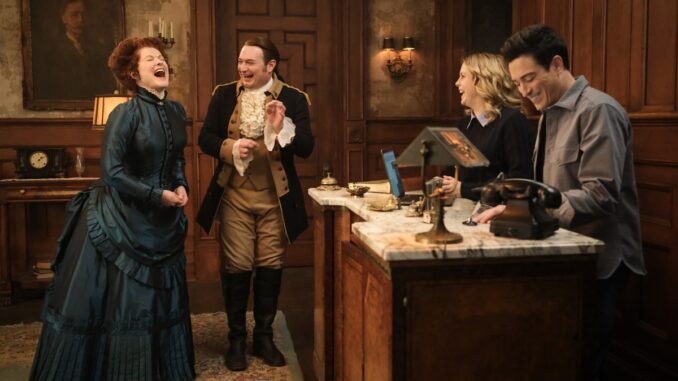
The Human Glitch: Ben Feldman Returns to the Afterlife and the Enduring Power of Imperfection in Ghosts
In the spectral landscape of "Ghosts," where centuries-old spirits grapple with mortality and the ever-changing world, Season 4 Episode 21, "The Night Before the Wedding," offers a poignant, albeit brief, return of Ben Feldman's Adam. His presence, a fleeting glitch in the afterlife's established mechanics, underscores the series' exploration of connection, the messy realities of love, and the surprising resilience of the human spirit, even in its most flawed form.
Adam's appearance, initially a bewildering moment for both the living and the dead, serves as a stark reminder of the show's central conceit: the arbitrary nature of ghosthood. While the parameters remain vague, the episode highlights the profound impact of unfinished business, particularly when intertwined with matters of the heart. Adam, who died in the show's first season, wasn't a seasoned ghost like Hetty or a tortured soul like Alberta. He was, in essence, an ordinary man, abruptly yanked from a promising life with his wife, Sam. His return suggests that the unresolved emotional ties, the "what-ifs" and unspoken words, can disrupt the very fabric of the spectral realm, pulling him back into the orbit of his grieving wife.
Feldman's portrayal, even in this brief cameo, is imbued with a relatable awkwardness and genuine affection. He isn't a polished, enlightened spirit, dispensing wisdom from beyond the veil. He's still the Adam we remember – the nervous, slightly goofy husband, desperately trying to reassure Sam and express his enduring love. This inherent imperfection is precisely what makes his return so compelling. It reinforces the show's argument that true connection lies not in achieving some idealized version of ourselves, but in embracing the messy, vulnerable reality of our human condition. He stumbles over his words, worries about disrupting Sam's happiness, and ultimately accepts the inevitability of letting go, a testament to his growth and the enduring strength of his love for Sam.
Furthermore, Adam's return allows "Ghosts" to grapple with the complex emotions surrounding grief and moving on. Sam, now deeply involved with Jay, faces the agonizing prospect of marrying another man while still carrying the weight of her love for Adam. His brief appearance forces her (and the audience) to confront the uncomfortable truth that love doesn't simply disappear. It lingers, evolves, and often coexists with new affections. Adam’s gentle encouragement, his affirmation of Sam's happiness with Jay, allows her to finally grant him, and herself, the peace needed to move forward. His willingness to let go, not just of Sam, but also of his own lingering desires, speaks to the transformative power of love and its ability to transcend even death.
Beyond the emotional weight, Adam's return also subtly pokes fun at the established tropes of the afterlife. The episode avoids grand pronouncements or definitive answers about the mysteries of ghosthood. Instead, it presents his presence as a quirky anomaly, a glitch in the system that raises more questions than it answers. This playful ambiguity is a hallmark of "Ghosts," allowing the show to explore profound themes without resorting to heavy-handed sentimentality. Adam’s return isn't about unraveling the secrets of the universe; it's about reminding us that even in the face of the unknown, human connection, with all its imperfections and complexities, remains the most powerful force.
In conclusion, Ben Feldman's return as Adam in "The Night Before the Wedding" is more than just a nostalgic cameo. It's a crucial narrative device that underscores the show's exploration of love, loss, and the enduring power of human imperfection. His brief appearance serves as a reminder that even in the realm of ghosts, the most profound connections are rooted in the messy, vulnerable realities of being human. Adam's willingness to let go, his genuine affection for Sam, and his endearing awkwardness solidify his legacy as a symbol of the enduring power of imperfect love in the face of the eternal unknown. He proves that even a ghost can learn to embrace the beauty of letting go, leaving behind a legacy of love that transcends the boundaries of life and death.